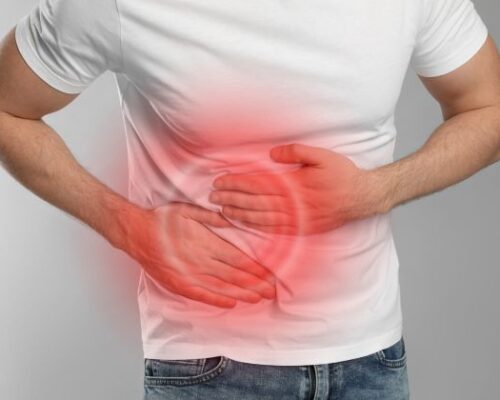What causes a burning feeling in the chest and throat?
Explore the most common gastrointestinal reasons behind chest and throat burning, how to relieve symptoms, and when to seek medical advice.
What causes a burning feeling in the chest and throat?
Explore the most common gastrointestinal reasons behind chest and throat burning, how to relieve symptoms, and when to seek medical advice.

Experiencing a burning feeling in the chest and throat can be distressing. Many people describe it as a hot or painful sensation rising from the upper abdomen, often following meals. It’s commonly mistaken for a heart-related issue, but in most cases, the cause is gastrointestinal. This is particularly true in Australia, where diet and lifestyle habits contribute to a high incidence of conditions like acid reflux.
From frequent spicy meals to late-night snacks, our routines often put strain on the digestive system. Understanding the causes and recognising the symptoms early on can help prevent the discomfort from becoming chronic. Managing it effectively can also improve quality of life and reduce the risk of complications.
Experiencing a burning feeling in the chest and throat can be distressing. Many people describe it as a hot or painful sensation rising from the upper abdomen, often following meals. It’s commonly mistaken for a heart-related issue, but in most cases, the cause is gastrointestinal. This is particularly true in Australia, where diet and lifestyle habits contribute to a high incidence of conditions like acid reflux.
From frequent spicy meals to late-night snacks, our routines often put strain on the digestive system. Understanding the causes and recognising the symptoms early on can help prevent the discomfort from becoming chronic. Managing it effectively can also improve quality of life and reduce the risk of complications.

Burning feeling in the chest and throat: Gastrointestinal causes
Gastro-oesophageal reflux disease (GORD)
It happens when stomach acid flows back into the oesophagus, often due to a weakened lower oesophageal sphincter. This acid irritates the lining of the oesophagus and causes a sensation of burning or discomfort, particularly after meals.
Hiatus hernia
A hiatus hernia occurs when part of the stomach pushes through the diaphragm into the chest. This structural issue can make acid reflux more likely. Many people with a hiatus hernia don’t know they have it until they experience symptoms.
Oesophagitis
Oesophagitis refers to inflammation of the oesophagus. This can result from prolonged acid exposure, infections, or certain medications. It often causes pain when swallowing, along with the characteristic burning sensation in the chest or throat.
Dyspepsia (indigestion)
Indigestion, or dyspepsia, is a general term that describes discomfort or pain in the upper abdomen. While it’s not always related to acid reflux, it can still cause a burning feeling, bloating, and nausea. It’s often triggered by overeating.

Burning feeling in the chest and throat: Gastrointestinal causes
Gastro-oesophageal reflux disease (GORD)
It happens when stomach acid flows back into the oesophagus, often due to a weakened lower oesophageal sphincter. This acid irritates the lining of the oesophagus and causes a sensation of burning or discomfort, particularly after meals.
Hiatus hernia
A hiatus hernia occurs when part of the stomach pushes through the diaphragm into the chest. This structural issue can make acid reflux more likely. Many people with a hiatus hernia don’t know they have it until they experience symptoms.
Oesophagitis
Oesophagitis refers to inflammation of the oesophagus. This can result from prolonged acid exposure, infections, or certain medications. It often causes pain when swallowing, along with the characteristic burning sensation in the chest or throat.
Dyspepsia (indigestion)
Indigestion, or dyspepsia, is a general term that describes discomfort or pain in the upper abdomen. While it’s not always related to acid reflux, it can still cause a burning feeling, bloating, and nausea. It’s often triggered by overeating.


Symptoms to watch for
Burning after meals
The most recognisable symptom is the burning sensation that rises into the chest or throat after eating. It may be worse after large meals or when bending over or lying flat.
Acidic or sour taste
Many people report a sour or bitter taste in the back of the throat. This is usually due to stomach acid backing up into the mouth, particularly when reflux is more severe.
Difficulty swallowing
A feeling that food is stuck or slow to go down can suggest inflammation in the oesophagus. This can make eating uncomfortable and may be a sign of a more serious issue.
Bloating and belching
Frequent bloating, gas, and belching may accompany the burning sensation in the throat. These symptoms can potentially result from swallowed air or delayed stomach emptying.
Symptoms to watch for
Burning after meals
The most recognisable symptom is the burning sensation that rises into the chest or throat after eating. It may be worse after large meals or when bending over or lying flat.
Acidic or sour taste
Many people report a sour or bitter taste in the back of the throat. This is usually due to stomach acid backing up into the mouth, particularly when reflux is more severe.
Difficulty swallowing
A feeling that food is stuck or slow to go down can suggest inflammation in the oesophagus. This can make eating uncomfortable and may be a sign of a more serious issue.
Bloating and belching
Frequent bloating, gas, and belching may accompany the burning sensation in the throat. These symptoms can potentially result from swallowed air or delayed stomach emptying.

Risk factors and lifestyle contributors
Large or late meals
Eating heavy meals or eating just before bed can increase pressure in the stomach and make reflux more likely. This habit can contribute to more frequent episodes of chest and throat burning.
Trigger foods and drinks
Certain foods like citrus, tomato-based sauces, and spicy meals relax the lower oesophageal sphincter or increase acid production. Coffee, tea, and carbonated drinks can also worsen symptoms.
Smoking and alcohol
Both smoking and drinking alcohol are known to weaken the lower oesophageal sphincter. This allows acid to travel upward into the oesophagus more easily, increasing the risk of discomfort.
Excess weight
Carrying extra weight, especially around the abdomen, can increase pressure on the stomach. This makes it easier for acid to escape and irritate the oesophagus, particularly when lying down.

Risk factors and lifestyle contributors
Large or late meals
Eating heavy meals or eating just before bed can increase pressure in the stomach and make reflux more likely. This habit can contribute to more frequent episodes of chest and throat burning.
Trigger foods and drinks
Certain foods like citrus, tomato-based sauces, and spicy meals relax the lower oesophageal sphincter or increase acid production. Coffee, tea, and carbonated drinks can also worsen symptoms.
Smoking and alcohol
Both smoking and drinking alcohol are known to weaken the lower oesophageal sphincter. This allows acid to travel upward into the oesophagus more easily, increasing the risk of discomfort.
Excess weight
Carrying extra weight, especially around the abdomen, can increase pressure on the stomach. This makes it easier for acid to escape and irritate the oesophagus, particularly when lying down.


When to see a doctor
Persistent symptoms
If you’re experiencing a burning feeling in the chest and throat more than twice a week, it may be a sign of GORD or another digestive condition. Ongoing symptoms should be assessed by a healthcare provider.
Lack of response to treatment
Over-the-counter medications like antacids can offer short-term relief, but if they stop working or symptoms return quickly, a medical review is important to identify the underlying cause of these conditions.
Red flag symptoms
Unexplained weight loss, persistent vomiting, or trouble swallowing are concerning signs that should be investigated promptly. These could indicate conditions like oesophageal ulcers or even precancerous changes.
Need for diagnosis and management
If lifestyle changes haven’t helped or the diagnosis is unclear, your doctor may suggest tests like an endoscopy or pH monitoring. These can guide more targeted treatments, from medication to dietary adjustments.
When to see a doctor
Persistent symptoms
If you’re experiencing a burning feeling in the chest and throat more than twice a week, it may be a sign of GORD or another digestive condition. Ongoing symptoms should be assessed by a healthcare provider.
Lack of response to treatment
Over-the-counter medications like antacids can offer short-term relief, but if they stop working or symptoms return quickly, a medical review is important to identify the underlying cause of these conditions.
Red flag symptoms
Unexplained weight loss, persistent vomiting, or trouble swallowing are concerning signs that should be investigated promptly. These could indicate conditions like oesophageal ulcers or even precancerous changes.
Need for diagnosis and management
If lifestyle changes haven’t helped or the diagnosis is unclear, your doctor may suggest tests like an endoscopy or pH monitoring. These can guide more targeted treatments, from medication to dietary adjustments.

Don’t ignore the ongoing burning feeling in the chest and throat
A burning sensation in the throat might seem harmless at first, but if it keeps coming back or gets worse, it could be a sign of a more serious gastrointestinal condition. Left unmanaged, issues like GORD or oesophagitis can lead to long-term damage, discomfort, and complications such as ulcers or narrowing of the oesophagus.
Getting the right diagnosis early can help you manage your symptoms properly, avoid unnecessary suffering, and protect your digestive health in the long term. If the burning sensation impacts your day-to-day life or you’re unsure what’s causing it, speak to your doctor as soon as possible. Taking action now could prevent more serious problems later.

Don’t ignore the ongoing burning feeling in the chest and throat
A burning sensation in the throat might seem harmless at first, but if it keeps coming back or gets worse, it could be a sign of a more serious gastrointestinal condition. Left unmanaged, issues like GORD or oesophagitis can lead to long-term damage, discomfort, and complications such as ulcers or narrowing of the oesophagus.
Getting the right diagnosis early can help you manage your symptoms properly, avoid unnecessary suffering, and protect your digestive health in the long term. If the burning sensation impacts your day-to-day life or you’re unsure what’s causing it, speak to your doctor as soon as possible. Taking action now could prevent more serious problems later.

FAQs
Could a throat infection cause a similar burning feeling in the chest and throat?
Yes, infections such as pharyngitis or tonsillitis can lead to throat irritation and burning, but they’re usually accompanied by other symptoms like fever or swollen glands. A doctor can help distinguish between infection and reflux.
Is it safe to exercise with this condition?
Gentle exercise is generally beneficial, but high-impact activities or bending over frequently may worsen reflux. It’s best to wait a couple of hours after eating before engaging in physical activity.
Do certain sleeping positions make it worse?
Yes, lying flat can allow acid to flow more easily into the oesophagus. Sleeping with your upper body elevated or lying on your left side may help reduce symptoms.
Can children experience the same symptoms?
Children can have reflux, too, although it may present differently. They might complain of a sore tummy or cough frequently. If symptoms persist, paediatric review is recommended.
